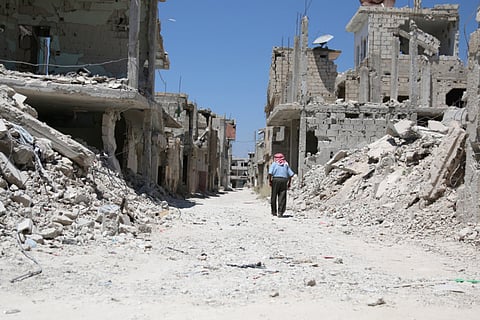No end to intractable Syria dilemma
The dilemma today is not what the international community envisages for Syria, but what the Syrian people demand

Carla del Ponte, a former attorney general from Switzerland who prosecuted war crimes in Rwanda and Yugoslavia, announced her imminent resignation from the United Nations Commission of Inquiry on Syria. The affable legal expert recognised that her work was “not backed by any political will” and acknowledged that she had “no power as long as the security council does nothing”. Her frustration came through when she added: “We are powerless, there is no justice for Syria”.
Will Syrians see justice and will the Bashar Al Assad rule be replaced by a democratising regime?
Del Ponte joined the three-member Syria inquiry in September 2012, and worked in earnest to chronicle various incidents that shocked the world, including the use of chemical weapons on civilians and the near-destruction of the Yazidi population. Mandated to observe and recommend, the UN commission, which reported on a periodic basis to the UN Security Council, pledged to continue its ongoing investigations “on behalf of the countless number of Syrian victims of the worst human rights violations and international crimes known to humanity”, though it remained powerless to mobilise the international community to act. No tribunal was created to try war crimes committed in the six-and-a-half year-old war. Even worse, there was no desire to refer the Syria file to the international criminal court in The Hague.
Of course, Al Assad remains in power for very specific reasons, despite the destruction of the country, an estimated 500,000 dead, as well as the forced displacements of half of Syria’s pre-war population of 22 million souls. Truth be told, no reason is as critical as the backing of powerful patrons, led by Iran and Russia, both of which are anxious to advance their own geo-strategic regional interests. In fact, the uprising against the Baath regime was going rather badly, when Moscow chose to intervene in 2015 and the Russian Air Force decimated various rebel groups. Russian air strikes and, more important, logistical support to the Syrian Arab Army, saved the Al Assad regime from an imminent fall. Iranian assistance proved to be critical too — including the readily available Hezbollah militiamen who answered to Tehran — but it was President Vladimir Putin who acted. Consequently, Damascus consolidated its grip on power, even if opposition forces persisted.
It was useful to note that the Russian leader played his geo-strategic cards rather well. He masterfully conned Washington as a relaxed and uninterested former United States president Barack Obama talked the talk but failed to walk the walk, which allowed Putin to literally offset American influence throughout the region, something that President Donald Trump confirmed. Remarkably, Putin and Trump reached an agreement to protect Israel from Syria when they agreed to create a virtual safe zone along the Golan border region. Trump launched a few missiles to destroy a Syrian air base — with Russian acquiescence — and participated in the coalition war against Daesh (the self-proclaimed Islamic State of Iraq and the Levant), but he was as reluctant as his predecessor to get sucked into the civil war. More recently, the Trump administration condemned the latest chemical attacks, even if it was reluctant to get involved beyond targeting a few Daesh militants.
These were not the only reasons why Al Assad endured of course, as dozens of opposition groups emerged during the past six years, none of which could rally fighters. Regrettably, moderate Syrians gave way to radicals, as internecine fighting weakened everyone, which literally meant that no united and serious opposition could emerge to replace Al Assad.
To his credit, Al Assad understood that global condemnations and sanctions against his regime would have little or no lasting impact, if he could somehow secure Russian and Iranian support. Towards that end, he demonstrated usefulness to Israel too, and earned the acquiescence of leading world powers, including the US, France and Russia. Naturally, such sponsorships might not last, though what Al Assad focused on was his life-or-death struggle. Under the circumstances, no one ought to expect him to be deterred by threats of economic sanctions, or being tried for war crimes against his nation.
Carla del Ponte’s “not backed by any political will” statement spoke volumes even if the vast majority of Arabs backed the principles of the Geneva 1 Declaration and those of UN Security Council Resolution 2254. While several governments supported the Astana talks, Arab countries favoured the formation of a transitional authority to govern Syria, the drafting of a new constitution, and the preparation for elections. Few saw a role for Al Assad.
The dilemma today is not what the international community envisages for Syria, but what the Syrian people demand. Indeed, the Baath regime may well endure in power, though, realistically, one wonders how deep in the abyss the hapless country will sink.
Dr Joseph A. Kechichian is the author of The Attempt to Uproot Sunni Arab Influence: A Geo-Strategic Analysis of the Western, Israeli and Iranian Quest for Domination (Sussex: 2017).


